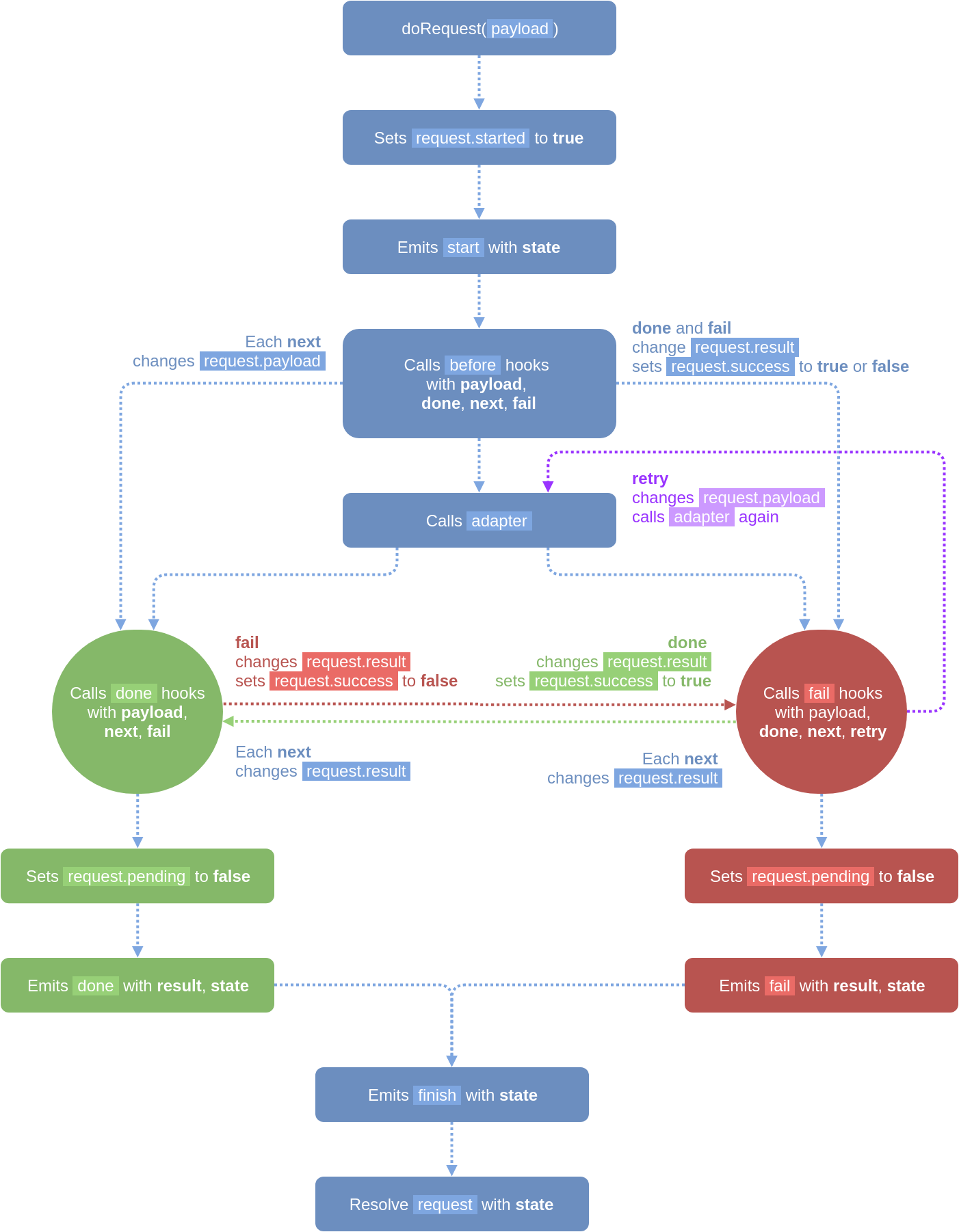Requests
Core function of Apicase is apicase (ba-dum-tss). It uses adapters, creates requests and does some good things.
Wrap adapters
Firstly, you need some adapter (e.g. fetch). Pass it to apicase and you'll get a function that works with this adapter:
import { apicase } from "@apicase/core"
import fetch from "@apicase/adapter-fetch"
const doFetchRequest = apicase(fetch)
Request structure
The received function takes an object with the following format:
doFetchRequest({
/* Just payload */
...payload,
/* Hooks object */
hooks: {
/* You can pass a single hook */
before: () => {},
/* Or array of hooks */
done: [() => {}, () => {}],
fail: () => {}
},
/* Meta info that is passed only to hooks */
meta: { foo: "bar" },
/* Specific request options (we'll talk about it later) */
options: {}
})
Simplest example:
const request = doFetchRequest({
url: "/api/posts",
method: "GET"
})
Response structure
This function returns an object with state, on/off and **start/cancel **and then/catch methods
State
It's just some flags, payload and result
request.success // If request is finished successful
request.pending // If request is running
request.started // If request was started
request.cancelled // If request was cancelled
request.payload // Request payload (here: { url, method })
request.result // Result from adapter (can have initial state, if adapter has)
Events
You can subscribe to events using .on() method and unsubscribe from 'em using .off()
request.on("done", (result, state) => {}) // On request success
request.on("fail", (result, state) => {}) // On request fail
request.on("finish", (result, state) => {}) // On request finish (success doesn't matter)
request.on("start", state => {}) // On request start
request.on("cancel", state => {}) // On request cancel
request.on("error", error => {}) // On JavaScript error happened
request.off("evt", callback) // Unsubscribe from event
// Syntax sugar
request.onDone(cb) === request.on("done", cb)
request.onFail(cb) === request.on("fail", cb)
You can add as much events as you want
Start and cancel
You can .start() and .cancel() requests:
request.start() // Start request (see "Requests+" when we need to start manually)
request.cancel() // Cancel request
Then and catch methods
Apicase also gives you .then() and .catch() methods to feel like it's just a Promise:
doFetchRequest({ url: "/posts" })
/* Always resolved (even when request has failed */
.then(state => {
console.log(state)
})
/* Rejected only when JS error happened */
.catch(err => {
console.error(err)
})
Since it returns thenable object, you can also use async/await
const { success, result } = await doFetchRequest({ url: '/posts' })
Request flow
Apicase creates a queue of hooks and adapter call. Let's see this diagram

Hooks are used for request-level logic. All hooks are asynchronous and have callbacks to continue the queue. It allows you to do another requests, check something, just sleep and do whatever you want in hooks.
Events are used for application-level logic.You cannot change request state from them. They are just made to listen to it. Also some adapters may emit custom events (like progress in xhr adapter)
Detecting state changes
Apicase has 3 additional events that are emitted on state changes.
All of them have the following structure:
request.on("change:state", ({ prev, next, diff }) => {
console.log(prev) // Previous state
console.log(next) // New state
console.log(diff) // Object with changed properties
})
- change:state - on state changes (
success,pending,started,cancelled,payload,result) - change:payload - on payload only changes (
payload.url,payload.headersetc) - change:result - on result only changes (
result.bodyetc)
You can use it to create services and connect them with your store (e.g. Vuex)